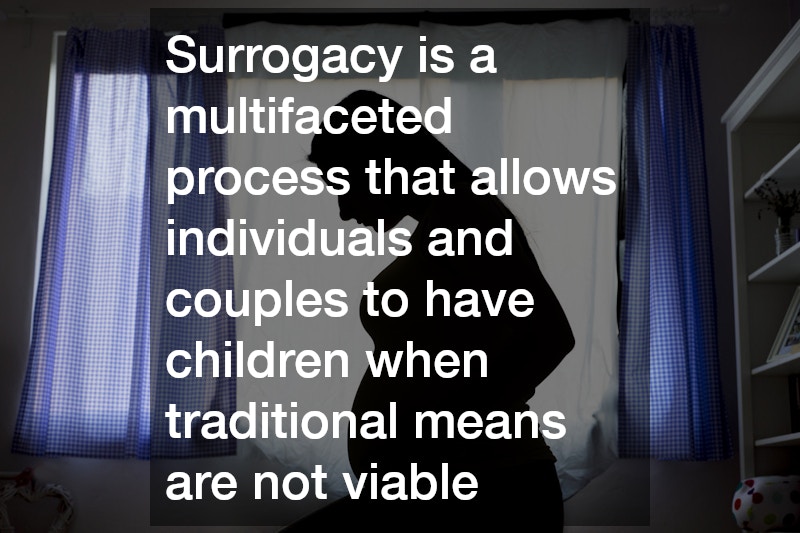What Does It Mean to Have a Baby Via Surrogate?
In recent years, surrogacy has become an increasingly prevalent method for individuals and couples to have a baby. As societal norms evolve, the acceptance of surrogacy as a viable option for parenthood has grown. Many factors, such as infertility, health risks, or personal circumstances, lead people to consider this path. Surrogacy offers a solution for those unable to carry a child themselves, providing them the chance to become parents. If you’re wondering, ” What is via surrogate?”, it’s crucial to understand its intricacies and the profound implications it has on all parties involved.
What is Surrogacy?
Surrogacy is a method of assisted reproduction where a woman, known as the surrogate mother, agrees to carry and give birth to a child for someone else. There are two primary types of surrogacy: traditional and gestational.
In traditional surrogacy, the surrogate is artificially inseminated with sperm from the intended father or a donor, making her the biological mother of the child. Conversely, in gestational surrogacy, an embryo created via in vitro fertilization (IVF) is implanted in the surrogate, who is not genetically related to the child. This distinction is critical, as it impacts the legal and emotional landscape surrounding surrogacy arrangements.
Gestational surrogacy is more common today, primarily due to the advances in reproductive technology and its legal advantages. The legal complexities are typically less pronounced when the surrogate has no genetic ties to the baby. Moreover, gestational surrogacy allows both prospective parents to have a biological connection to their child, if both the egg and sperm are provided by them. This type of surrogacy also opens doors for same-sex couples and individuals who wish to have genetically related children. Understanding these distinctions is essential for anyone considering surrogacy as a path to parenthood.
The ethical and legal considerations surrounding surrogacy vary widely across different regions and cultures. In some places, commercial surrogacy is legally permitted and regulated, whereas, in others, it might be restricted or even banned. The ethical debates often revolve around issues like commodification, exploitation, and the rights and welfare of all involved, including the surrogate. It’s essential to navigate these complexities with sensitivity and awareness, ensuring that the decisions made respect everyone’s rights and well-being. As society grows more accepting of diverse family structures, the surrogacy landscape continues to evolve.
Who Can Benefit from Surrogacy?
Surrogacy can be a viable option for a broad spectrum of individuals and couples. For heterosexual couples facing infertility issues, surrogacy provides an opportunity to have a biological child when other options have failed. It can be particularly beneficial for women who cannot carry a pregnancy due to medical conditions or who have had recurring miscarriages. Same-sex male couples often turn to gestational surrogacy to have children who are biologically related to them. In addition, individuals who wish to become single parents may also pursue surrogacy to start their families.
Surrogacy also serves as a solution for individuals who have undergone medical treatments that affect fertility. For example, cancer survivors who have had treatments that damage reproductive organs might choose surrogacy as their pathway to parenthood. Additionally, surrogacy can be an option for those who have had hysterectomies or other surgeries that impact their ability to conceive or carry a pregnancy to term. Beyond medical reasons, some individuals and couples prefer surrogacy for personal reasons, such as avoiding pregnancy-related health risks. The accessibility of surrogacy allows a diverse group of people to fulfill their dreams of having children.
How Does the Surrogacy Process Work?
The surrogacy process involves multiple stages, starting with the initial consultation and planning phase. Intended parents typically begin by selecting a surrogacy agency that will guide them through the journey. The agency helps match them with a suitable surrogate, taking into account factors like health, lifestyle, and mutual compatibility. Once a match is made, legal agreements are established to outline the rights and responsibilities of both the intended parents and the surrogate. These contracts are vital for protecting the interests of all parties and ensuring a smooth process.
After the legal aspects are resolved, the medical process begins. In gestational surrogacy, this involves creating an embryo via in vitro fertilization (IVF) using the intended parents’ biological materials or donor gametes. The embryo is then implanted into the surrogate, who will carry the pregnancy to term. Throughout the pregnancy, the health and well-being of the surrogate and the developing baby are closely monitored. Regular medical check-ups and open communication between the surrogate and intended parents are crucial for a successful surrogacy experience.
Upon birth, the legal framework comes into play once again to ensure the transfer of parental rights. Depending on the jurisdiction, additional legal steps may be required, such as establishing parental recognition through court orders or amending birth certificates. The post-birth phase also includes addressing emotional considerations, as the surrogate and intended parents adjust to their new roles. While the surrogacy journey can be complex and emotionally charged, with careful planning and support, it can lead to rewarding and fulfilling outcomes for everyone involved. As technology and societal attitudes continue to progress, surrogacy remains a dynamic and evolving method of family-building.
In summary, surrogacy is a multifaceted process that allows individuals and couples to have children when traditional means are not viable. It accommodates a diverse range of family structures and offers solutions to complex fertility challenges. However, it also involves significant legal, ethical, and emotional considerations that must be thoughtfully navigated. As society continues to embrace diverse family dynamics, surrogacy will likely become an even more prominent part of the family-building landscape.
.




